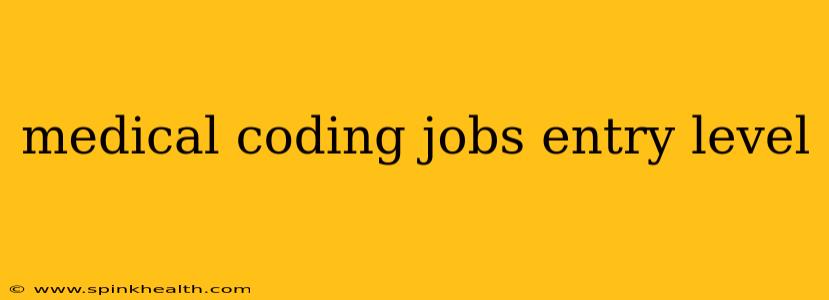The world of healthcare is vast and complex, but behind every doctor's visit, every lab test, and every procedure lies the crucial work of medical coders. These professionals translate medical diagnoses, procedures, and services into standardized alphanumeric codes, ensuring accurate billing and reimbursement. If you're detail-oriented, enjoy problem-solving, and have a knack for deciphering complex information, an entry-level medical coding job might be the perfect fit for you. This journey begins with understanding the landscape and navigating your path to success.
My name is Sarah, and I've been a medical coder for over ten years, starting just like you—at an entry level. Let me share my experiences and guide you through this exciting career path.
What Does a Medical Coder Do?
At its core, medical coding involves converting medical documentation into standardized codes using systems like ICD-10-CM (International Classification of Diseases, 10th Revision, Clinical Modification) for diagnoses and CPT (Current Procedural Terminology) for procedures. Imagine being a translator between the medical world and the billing world. Your accuracy directly impacts the financial health of healthcare facilities. This isn't just about numbers; it's about ensuring patients receive the correct care and providers are fairly compensated.
What Education and Training Do I Need for Entry-Level Medical Coding Jobs?
Many entry-level positions require at least a high school diploma or equivalent. However, a significant advantage lies in obtaining a formal education, such as an Associate's degree in Health Information Technology (HIT) or a certificate in medical coding. These programs equip you with the essential knowledge of anatomy, physiology, medical terminology, and coding conventions. Don’t overlook online courses and certifications – they are a great option for flexible learning and building your resume.
What Skills Are Essential for Success in an Entry-Level Medical Coding Job?
Beyond formal training, certain skills are crucial for success:
- Attention to Detail: This is non-negotiable. A single misplaced digit can lead to significant errors.
- Analytical Skills: You need to dissect complex medical reports and accurately identify the appropriate codes.
- Medical Terminology Knowledge: Understanding the language of medicine is the foundation of your work.
- Computer Proficiency: Medical coding software is your daily tool.
- Time Management: Meeting deadlines and managing your workload is key.
- Communication Skills: While the work itself is primarily independent, communicating effectively with colleagues and supervisors is vital.
How Can I Find Entry-Level Medical Coding Jobs?
Finding your first medical coding role might feel daunting, but with a focused approach, you can increase your chances:
- Online Job Boards: Utilize sites like Indeed, LinkedIn, and Monster. Filter your searches for "entry-level medical coder," "medical coding specialist," or "coder."
- Networking: Attend healthcare industry events and connect with professionals in the field.
- Hospital Websites: Many hospitals and clinics post job openings directly on their websites.
- Temporary Agencies: Consider working through temporary agencies to gain experience and build your network.
What is the Average Salary for Entry-Level Medical Coders?
Salaries vary by location, experience, and employer. Research the average salaries in your area to get a realistic expectation. Entry-level positions generally start at a lower rate, offering room for advancement with experience and further certifications.
What are the Career Advancement Opportunities in Medical Coding?
Medical coding offers excellent growth potential. With experience, you can advance to positions such as:
- Senior Medical Coder: Increased responsibility and possibly a supervisory role.
- Medical Coding Auditor: Reviewing codes for accuracy and compliance.
- Medical Coding Manager: Overseeing a team of coders.
- Medical Billing Specialist: Expanding your skills into medical billing.
What are the Challenges of an Entry-Level Medical Coding Job?
Like any job, medical coding presents challenges:
- High Volume of Work: The workload can be intense, demanding attention to detail throughout the day.
- Constant Updates: Coding guidelines are regularly updated, necessitating continuous learning.
- Repetitive Tasks: The work can be repetitive for some individuals.
Embarking on a career in medical coding is a rewarding experience. With dedication, the right training, and a keen eye for detail, you can build a successful career in this essential healthcare field. Remember to utilize online resources, network, and remain persistent in your job search. Good luck on your journey!

